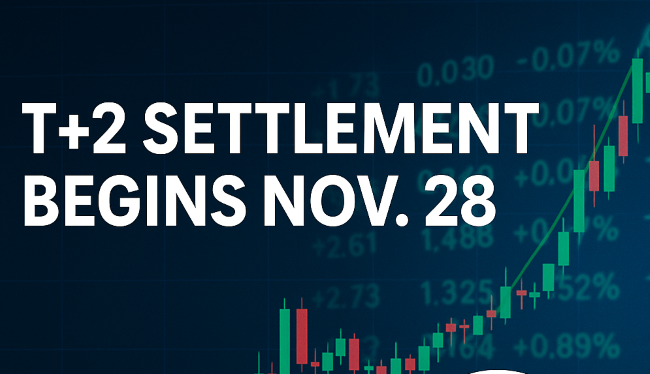Nigeria Switches to T+2 Settlement Cycle Nov. 28 as SEC Fast-Tracks Market Reform

Nigeria’s capital market is set for a major structural upgrade as the Securities and Exchange Commission (SEC) formally initiates the long-awaited transition from a T+3 to a T+2 settlement cycle for equities transactions, effective November 28, 2025.
This reform marks one of the most significant market-efficiency milestones in over a decade, bringing the Nigerian market closer to global benchmarks and dramatically reshaping liquidity flows across the financial system.
Why the T+2 Shift Matters
Under a T+2 (Trade Date + 2 days) settlement framework, equities transactions are fully executed—ownership transferred and payment completed—within two business days.
For example:
A trade executed on Monday settles by Wednesday, delivering faster capital recycling to investors and brokers.
The existing T+3 system, in place for years, slowed transaction velocity and exposed investors to longer counterparty risk. The move to T+2 places Nigeria in alignment with markets such as the US, UK, EU, India, South Africa, and other advanced exchanges that have long adopted shorter settlement cycles to enhance liquidity and reduce systemic risks.
A Leap Toward a Modern, High-Performance Capital Market
In a notice issued by Efe Ebelo, Head of External Relations at the SEC, the Commission confirmed that the transition follows extensive market readiness tests and full operational alignment with key ecosystem stakeholders.
The Central Securities Clearing System (CSCS) — Nigeria’s central counterparty and settlement engine — has been the backbone of this transformation, investing heavily in technology upgrades, systems redundancy, and participant testing.
According to the SEC:
“Extensive testing with market participants has been successfully conducted without any reported issues, reflecting high confidence in the market’s preparedness for this landmark change.”
How the First Week of T+2 Will Work
- Trades executed on Thursday, Nov. 27 (still under T+3) will settle Dec. 2, 2025.
- Trades executed on Friday, Nov. 28 (first T+2 cycle) will also settle Dec. 2, 2025.
This synchronised schedule ensures a smooth migration and eliminates the risk of settlement overlaps.
Broader Implications for the Capital Market
The shift to T+2 is more than a logistics update — it is a direct play to:
✔ Improve liquidity in the equities market
Investors gain faster access to cash, boosting reinvestment cycles and increasing trading activity.
✔ Reduce counterparty and settlement risk
A shorter period between trade execution and settlement lowers default exposures across the system.
✔ Strengthen investor confidence
Institutional investors, particularly foreign portfolio investors, generally prefer T+2 markets due to efficiency and lower clearance delays.
✔ Position Nigeria competitively in global capital flows
With global fund managers increasingly screening for settlement efficiency, T+2 enhances Nigeria’s attractiveness and prepares the ecosystem for future reforms — including potential moves to T+1, already under consideration in some advanced markets.
A Critical Structural Reform at the Right Time
The SEC emphasised its commitment to building a more transparent, modern, and investor-responsive market, with the transition to T+2 serving as a cornerstone of its broader market infrastructure reform agenda.
For Nigeria, which has been pushing aggressively to attract deeper foreign investment, improve market depth, and solidify the nation’s path to becoming a $1 trillion economy, the timing is strategic.
A faster settlement cycle boosts:
- brokerage competitiveness,
- market liquidity,
- price discovery, and
- overall market efficiency.
The Bottom Line
Nigeria’s transition to T+2 marks a new era of speed, efficiency, and competitiveness. With successful implementation, the reform is positioned to unlock market liquidity, strengthen investor trust, reduce systemic risk — and reaffirm Nigeria’s ambition to become a world-class investment destination.
BRANDECONOMY will continue to track implementation, market reactions, and the broader impact on the equities landscape.











